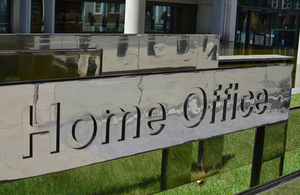Home Secretary announces action plan to tackle acid attacks
Victims and survivors will be at the centre of a new government strategy aimed at reducing the number and impact of acid attacks.

Home Office sign
As part of the action plan, the Crown Prosecution Service’s (CPS) guidance to prosecutors will be reviewed to ensure it makes clear that acid and other corrosive substances can be classed as dangerous weapons, and what is required to prove intent.
In addition, the Poisons Act 1972 will be reviewed to assess whether it should cover more acids and harmful substances, and the Home Office will work with police and the Ministry of Justice to assess whether the powers available to the courts, including sentencing, are sufficient to deal with these serious offences.
These measures will form part of a wide-ranging review of the law enforcement and criminal justice response, existing legislation, access to harmful products and the support offered to victims.
New guidance will also be provided to police officers on preventing attacks, searching potential perpetrators for harmful substances and responding to victims at the scene. And further work will also take place with retailers to agree measures to restrict sales of acids and other corrosive substances.
Home Secretary Amber Rudd said:
Acid attacks are horrific crimes which have a devastating effect on victims, both physically and emotionally.
It is vital that we do everything we can to prevent these sickening attacks happening in the first place.
We must also ensure that the police and other emergency services are able to respond as effectively as possible, that sentences reflect the seriousness of the offences and victims are given the immediate support they need.
The announcement comes as indicative figures from the National Police Chiefs’ Council (NPCC) suggest that more than 400 acid or corrosive substance attacks were carried out in the six months up to April 2017, based on returns from 39 forces in England and Wales. The returns also indicated that bleach, ammonia and acid were the most commonly used substances.
The action plan has been developed with the help of the police, health professionals and retailers and follows an event on Tuesday, 4 July, which was hosted by the Home Office and the NPCC.
Other measures in the action plan include:
-
improving police recording and reporting of offences;
-
commissioning research to better understand the motivations for carrying out these attacks;
-
confirming appropriate support is provided to victims, from the initial medical response to giving evidence in court and the long-term recovery beyond; and
-
ensuring that victim impact statements are completed in every case by the police so courts are made aware of the full impact of the attack. The police will also be encouraged to prepare Community Impact Statements to show how such attacks have affected communities.
NPCC lead for Corrosive Attacks, Assistant Chief Constable Rachel Kearton said:
Police have dealt with a number of high-profile cases in recent months and we continue to collect data from police forces across England and Wales to understand the scale and extent of these attacks and develop our ability to support and protect victims.
While it is virtually impossible to ban the sale of all corrosive substances, we are working closely with the Home Office and retailers to determine how we can keep these products from people who intend to cause harm.
I would urge anyone who is a victim of this type of attack to report it so that we can deal with the matter positively and sensitively.
The Minister for Crime, Safeguarding and Vulnerability, Sarah Newton, will outline the plans during a Parliamentary debate in the Commons tomorrow (Monday, 17 July).